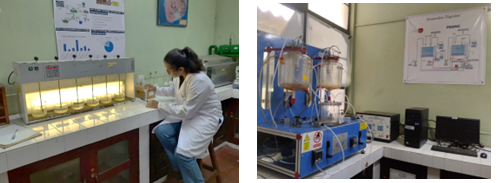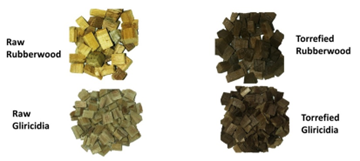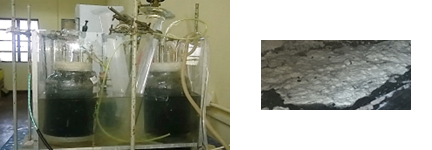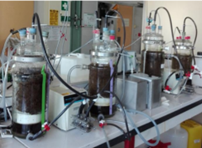The energy and environment related research focus on wastewater treatment, life cycle assessment, process simulation, process parameter optimization, industrial waste heat integration and environmental risk assessment. In this research area activities cover a wide range of topics including but not limited to emission control, life cycle assessment of bioethanol production, wastewater treatment using biological digestion, bio-gas combustion systems, ceramic firing processes, torrefaction and wood pellet production

Team:
- Prof. Ajith de Alwis
- Prof. P. G. Rathnasiri
- Prof. Mahinsasa Narayana
- Prof. Jagath Premachandra
- Prof. Manisha Gunasekera
- Dr. H.H.M.P. Rathnayake
- Dr. Dilhara Sethunga
- Dr. (Mrs.) Duleeka Gunarathne
- Dr. Thushara Subasinghe
Our Research Cases:
Biomass torrefaction for combustion and co-firing applications
This research aims to enhance biomass properties such as calorific value, energy density, grindability and hydrophobicity mainly for combustion and co-firing applications. Understanding torrefaction performance of different biomass types in inert and oxidative atmospheres and optimizing process parameters are the objectives of this research. A collaboration is also ongoing in this area with Prof. Wei-Hsin Chen from the Department of Aeronautics and Astronautics at National Cheng Kung University in Taiwan.

More information:
Dr. Duleeka Gunarathne
Torrefaction Severity and Performance of Rubberwood and Gliricidia, Udya Madhavi Aravindi Devaraja, Sachini Supunsala Senadheera and Duleeka Sandamali Gunarathne, Renewable Energy, 195, 2022
Oxidative Torrefaction and Torrefaction-based Biorefining of Biomass: A Critical Review, Udya Madhavi Aravindi Devaraja, Chamini Lakshika Wickramarathna Dissanayake, Duleeka Sandamali Gunarathne and Wei-Hsin Chen, Biofuel Research Journal, 35, 2022.
Washing pretreatment of agricultural waste for combustion applications
This research is aimed at addressing the challenges in utilizing agricultural wastes like rice husk and rice straw in combustion applications. The main objectives of this research are understanding the ways to modify ash chemistry by water and acid washing pretreatment and optimization of washing parameters.
More information:
Dr. Duleeka Gunarathne
Parametric and Kinetic Study of Washing Pretreatment for K and Cl Removal from Rice Husk Melani Anuradha Peiris and Duleeka Sandamali Gunarathne, Heliyon, 7, 2021.
Hot Water Washing of Rice Husk for Ash Removal: The Effect of Washing Temperature, Washing Time and Particle Size, Yasas Wishvajith Bandara, Pringa Gamage and Duleeka Sandamali Gunarathne, Renewable Energy, 153, 2020.
Modelling, simulation and optimization of biomass combustion and gasification systems
System-level simulation studies provide technical, economic and environmental feasibility of new concepts. This research area is aimed at evaluating fuel switching, co-firing and material/heat integration in different combustion and gasification systems.
More information:
Dr. Duleeka Gunarathne
Torrefied Biomass Combustion in Biomass-powered Boilers: Process Simulation-based Case Study Analysis of Power Generation and Thermal Energy Generation, U. M. A. Devaraja, S. D. S. Supunsala, S. W. Abeysiriwardane, and R. M. D. S. Gunarathne, Vidulka National Energy Symposium, Colombo, Sri Lanka, 2019, 219-229.
Technical and Environmental Feasibility of Co-firing Torrefied Biomass in a Coal-fired Power Plant, U.M.A. Devaraja, S.D.S. Supunsala and Duleeka Sandamali Gunarathne, Moratuwa Engineering Research Conference (MERCon), Moratuwa, Sri Lanka, 2020, 499-504.
Parametric Study of Flue Gas Driven Biomass Gasification, Dilini Dharmasiri, Dinu Welarathna, Praveena Madhubhani and Duleeka Sandamali Gunarathne, 7th Virtual International Conference on Science, Technology and Management in Energy (eNergetics), 2021.
Micro aeration of anaerobic digesters to reduce H2S emission in latex wastewater treatment plants.

This study investigates the effect of micro aeration in Skim Latex Wastewater (SLW) in an ammonia-rich environment. SLW contains sulphate, ammonia, and protein at significant levels. This newly developed biodigester is called a Single-stage Sulphate-removal Micro-aerated Anaerobic Digester (SSMAD). The sulphurous compounds in the SSMADs were varied and the yield and stability of the generated elemental sulphur were monitored.
More information:
Prof. P. G. Rathnasiri
Effect of Micro Aeration on Sulphurous Pollutants Removal from Skim Latex Wastewater IR Samarathunga, PG Rathnasiri - Water, Air, & Soil Pollution, 2023.
Optimization of high solids batch anaerobic co-digestion of lignocellulosic biomass and cow dung under mesophilic temperature conditions.
High solids anaerobic digesters are frequently reported as failures. This study developed strategies to minimize inhibition of anaerobic conversion process at start up. Leachate recirculation caused to reduce VFA retained in the pockets of high solids reactor content.

More information:
Prof. P. G. Rathnasiri
A.L. Wickramaarachchi, P.G. Rathnasiri, M. Torrijos, R. Escudie, M. Narayana., Journal of the National Science Foundation of Sri Lanka, 2022, 50(1): 125-136
